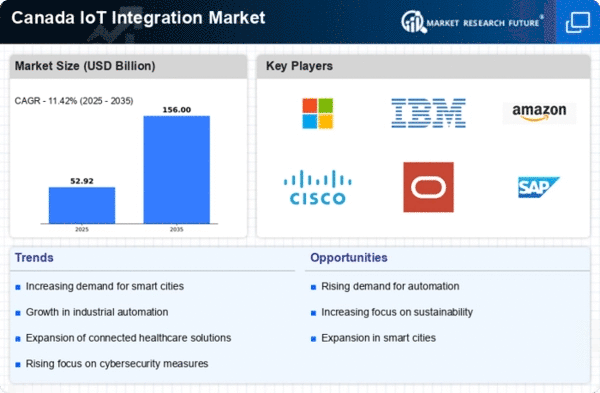Rising Demand for Automation
The increasing demand for automation across various sectors in Canada is a primary driver for the IoT integration market. Industries such as manufacturing, agriculture, and healthcare are actively seeking to enhance operational efficiency through automated processes. This trend is evidenced by a reported growth of 25% in the adoption of IoT solutions aimed at automating routine tasks. As businesses recognize the potential for cost savings and improved productivity, investments in IoT integration technologies are expected to rise. The integration of IoT devices allows for real-time monitoring and control, which is crucial for maintaining competitive advantage. Consequently, the is likely to experience substantial growth. as more organizations prioritize automation in their strategic initiatives.
Growing Focus on Sustainability
The increasing emphasis on sustainability and environmental responsibility is driving the IoT integration market in Canada. Organizations are increasingly adopting IoT solutions to monitor and reduce their carbon footprint, optimize resource usage, and enhance energy efficiency. For example, IoT-enabled smart grids and energy management systems are gaining traction, with a projected market growth of 20% in the next few years. This trend reflects a broader societal shift towards sustainable practices, where businesses are held accountable for their environmental impact. As companies seek to align with consumer expectations and regulatory requirements, the demand for IoT integration technologies that support sustainability initiatives is likely to rise, further propelling market growth.
Government Initiatives and Support
Government initiatives aimed at fostering innovation and technology adoption are significantly influencing the IoT integration market in Canada. Various federal and provincial programs are designed to support the development and implementation of IoT solutions across multiple sectors. For instance, funding opportunities and tax incentives for technology startups have been introduced, which could potentially lead to a 30% increase in IoT-related projects. Furthermore, the Canadian government is actively promoting smart city initiatives, which rely heavily on IoT integration to enhance urban infrastructure and services. This supportive environment is likely to accelerate the growth of the IoT integration market as businesses leverage government resources to implement advanced technologies.
Emerging Use Cases Across Industries
The emergence of diverse use cases across various industries is a significant driver for the IoT integration market in Canada. Sectors such as healthcare, transportation, and retail are increasingly exploring innovative applications of IoT technologies. For instance, telemedicine and remote patient monitoring are gaining popularity in healthcare, while smart logistics solutions are transforming transportation. This diversification of use cases is expected to contribute to a 15% growth in the IoT integration market as businesses recognize the potential for enhanced service delivery and customer satisfaction. The ability to tailor IoT solutions to specific industry needs is likely to attract more organizations to invest in integration technologies, further stimulating market expansion.
Advancements in Connectivity Technologies
Advancements in connectivity technologies, such as 5G and LPWAN (Low Power Wide Area Network), are playing a crucial role in shaping the IoT integration market in Canada. These technologies enable faster and more reliable communication between IoT devices, which is essential for real-time data processing and analytics. The rollout of 5G networks is expected to enhance the capabilities of IoT applications, potentially leading to a 40% increase in device connectivity. As businesses seek to leverage these advancements for improved operational efficiency and customer engagement, the IoT integration market is likely to benefit from increased investments in connectivity solutions. This trend underscores the importance of robust infrastructure in facilitating the growth of IoT technologies.
















